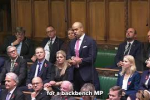
On October 3 last year, Tomasz Oleszak was stabbed in the chest in Whitehills Nature Park in Gateshead. He died the following day. He was 14.
His assailant, 14-year-old Leighton Amies, had taken a steak knife from his kitchen “for reassurance”. He didn’t know Oleszak – the two had never met – and yet following a confrontation Amies stabbed him in the chest.
Afterwards, Amies boasted back to Oleszak’s group “I’ve wetted your boy”; it will come as no surprise that “wetting” is slang for stabbing.
The announcement of a proposed ban on the sale and possession of long-bladed weapons, specifically machetes and so-called zombie knives, is a welcome step on the path to halting the growing threat of knife crime.
But it is not a panacea, nor is it the first time the idea has been floated. Nor would Oleszak have been saved by such a ban; he was stabbed with a steak knife, and yours, mine and every other kitchen in the country has a similar knife in one of its drawers.
The key to this issue is demonstrated by Amies’s age, and the language he used after callously committing such a heinous act.
I know far more about knife crime than I would like to, living in Haringey, an area of North London with some of the highest knife crime rates in the country where it has sadly become an all-too-regular occurrence.
Since the start of 2021 some 13 people have been murdered within a mile and a half of my home; three of those – Anas Mezenner, Stelios Averkiou, and Ali Baygoren – were children. Moreover, in each case those tried and convicted of their murders were also children.
The elephant in the room is: what is driving children to kill?
The issue of knife crime is fundamentally one of culture, not of access to elaborate bladed weapons. If we are to effectively combat the scourge of serious youth violence, we need an uncomfortable and robust public dialogue about the culture pervasive across entertainment media and cynical corporate marketing.
It targets young people, particularly boys from lower socio-economic demographics, by leveraging the most detrimental aspects of black culture, valorising criminality and gang culture and fuelling a toxic, nihilistic attitude.
It is easy to point the finger at “certain communities” when black boys are disproportionately represented amongst both the victims and the perpetrators of knife crime. But it is the culture that underpins that representation which is the problem, particularly given the cynical way it leverages those convicted of crime.
Adidas used British rapper Headie One as the star of their advertising campaign in December 2019 whilst he was awaiting trial for possession of a knife. He received a six-month sentence; it was the fourth time he had been to prison.
We don’t need to look far to see how this influence is exploited to be made attractive. But given how many organisations are guilty of this – from Adidas to the Guardian, BBC Radio 1, and even Netflix, not to mention the pervasive influence of social media platforms – this is a far broader issue to tackle than any political party likely has an appetite for.
But how have we reached a stage where children are prepared to kill? In a country as affluent as Britain it is unconscionable, let alone over something as trivial as a mobile phone or a perceived slight.
Adopting the mindset of being prepared to take a life doesn’t happen on a whim. That we have children for whom carrying a weapon has become normalised behaviour should be a national scandal.
Yet the fact that there is so little outrage is indicative of how little mainstream media coverage it actually receives. Each and every death is a tragedy, yet the selective manner in which some murders receive extensive coverage, whilst others go all but unmentioned, tells you much of what you need to know about why this issue is perpetually glossed over.
Lastly, we need to recognise that this issue is not party-political. We have already seen Yvette Cooper make political capital out of the announcement of the proposed ban by criticising that it is not enough.
But this rings entirely hollow when so many of her Labour colleagues are prepared to ignore an issue rampant in their own seats; the three child murders referred to earlier took place in the constituency of Tottenham, yet you will struggle to find any mention of them by David Lammy.
Very often any debate around knife crime quickly devolves into opposition soundbites regarding lack of investment in youth services and police cuts, both of which present safe ground from which to score political points.
MPs need to be prepared to discuss uncomfortable subjects around serious youth violence. There are undoubtedly difficult conversations to be had, but we are unlikely to see significant results by continuing to skirt them – and this abdication of responsibility continues to cost young lives.
It is essential that the Government addresses this scourge. But that demands an holistic strategy, designed to tackle every aspect of what is clearly a complex and multi-faceted problem.
The banning of machetes and zombie knives would be a prudent first step, but in isolation it will do little; no hydra is slain by the loss of a single head.
Those carrying such weapons now are not deterred by the prospect of arrest. They are children, and their world is small. They are encouraged by the other children around them, through peer pressure and through fear.
For these teenagers, the threat comes not by the rare occasion that they may encounter the police, but from a phone, and the world within it. That is a far more nebulous adversary to combat.




